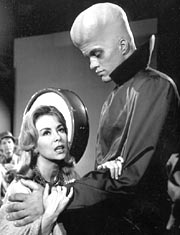
Q is a fictional character as well as the name of a race in Star Trek appearing in the Next Generation, Deep Space Nine, and Voyager series, and in related media. The most familiar Q is portrayed by John de Lancie. He is an extra-dimensional being of unknown origin who possesses immeasurable power over time, space, the laws of physics, and reality itself, being capable of altering it to his whim. Despite his vast knowledge and experience spanning untold eons, he is not above practical jokes for his own personal amusement, for a Machiavellian and manipulative purpose, or to prove a point. He is said to be almost omnipotent, and he is continually evasive regarding his true motivations.

"Time Enough at Last" is the eighth episode of the American television anthology series The Twilight Zone. The episode was adapted from a short story written by Lynn Venable. The short story appeared in the January 1953 edition of the science fiction magazine If: Worlds of Science Fiction about seven years before the television episode first aired. "Time Enough at Last" became one of the most famous episodes of the original Twilight Zone and has been frequently parodied since. It is "the story of a man who seeks salvation in the rubble of a ruined world" and tells of Henry Bemis, played by Burgess Meredith, who loves books, yet is surrounded by those who would prevent him from reading them. The episode follows Bemis through the post-apocalyptic world, touching on such social issues as anti-intellectualism, the dangers of reliance upon technology, and the difference between aloneness (solitude) and loneliness.
"Judgment Night" is episode 10 of the American television anthology series The Twilight Zone.
"What You Need" is episode 12 of the American television anthology series The Twilight Zone. It is based on the short story of the same name by Lewis Padgett.
"I Shot an Arrow into the Air" is episode 15 of the American television anthology series The Twilight Zone.
"Elegy" is episode 20 of the American television anthology series The Twilight Zone. It originally aired on February 19, 1960 on CBS.
"King Nine Will Not Return" is the season two premiere episode, and 37th overall, of the American television anthology series The Twilight Zone. It originally aired on September 30, 1960 on CBS.
"Deaths-Head Revisited" is episode 74 of the American television anthology series The Twilight Zone. The story is about a former SS officer revisiting the Dachau concentration camp a decade and a half after World War II. The title is a play on the Evelyn Waugh novel Brideshead Revisited.

"Quarantine" is the second segment of the seventeenth episode from the first season (1985–86) of the television series The Twilight Zone.

"The Paradise Syndrome" is the third episode of the third season of the American science fiction television series Star Trek. Written by Margaret Armen and directed by Jud Taylor, it was first broadcast October 4, 1968.

"To Serve Man" is episode 89 of the anthology series The Twilight Zone (1959). It originally aired on March 2, 1962 on CBS. Based on Damon Knight's 1950 short story of the same title, the episode was written by Rod Serling and directed by Richard L. Bare. It remains one of the best known episodes from the series, particularly for its final twist.
"Probe 7, Over and Out" is an episode of the American television anthology series The Twilight Zone. Its plot is a shaggy God story.
"On Thursday We Leave for Home" is an episode of the American television anthology series The Twilight Zone. In this episode, a struggling colony on a distant planet awaits the arrival of a ship that will take them back to Earth. The story centers around the resulting cross-cultural encounter and the enduring ties to one's home planet, chiefly as seen through the eyes of the colony's leader, William Benteen.
The Negative Zone is a fictional setting, an antimatter universe appearing in American comic books published by Marvel Comics. The location is depicted in various publications from Marvel, most frequently in Fantastic Four and Captain Marvel. Created by Stan Lee and Jack Kirby, it first appeared in Fantastic Four #51.
"The Little People" is episode 93 of the American television anthology series The Twilight Zone. It originally aired on March 30, 1962 on CBS.
"The Gift" is episode 97 of the American television anthology series The Twilight Zone.
"Passage on the Lady Anne" is an episode of the American television anthology series The Twilight Zone. In this episode, a couple whose marriage is struggling travel aboard an aging ocean liner, unaware that the ship is on a final voyage into the afterlife.

"Death Ship" is an episode of the American television anthology series The Twilight Zone, based on a short story with the same title by Richard Matheson. The story was inspired by the legend of the Flying Dutchman. In this episode, a spaceship crew discovers a wrecked replica of their ship with their own dead bodies inside.

Dick Sand, A Captain at Fifteen is a Jules Verne novel published in 1878. It deals primarily with the issue of slavery, and the African slave trade by other Africans in particular.